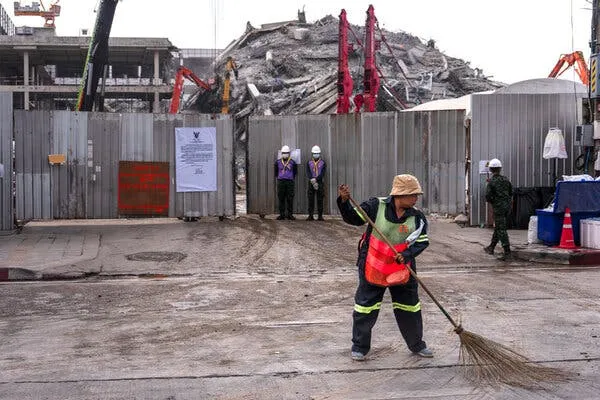Introduction
In a dramatic turn of events, Thai authorities have arrested a high-ranking executive of a Thai-Chinese construction company implicated in the collapse of a recently completed skyscraper in Bangkok. This monumental incident not only sent shockwaves through the construction industry but also raised pressing questions surrounding safety regulations and accountability in a country prone to seismic activity.
The Collapse of Bangkok Tower
The towering edifice, known for its sleek design and architectural marvel, fell victim to a powerful earthquake that rocked the region earlier this month. As debris cascaded down from the structure, it highlighted a serious concern regarding the safety measures that were reportedly employed during the building’s construction. Preliminary investigations suggested that corner-cutting may have contributed significantly to the disaster, prompting investigations into the companies responsible for its construction.
The Arrest
The executive’s arrest came swiftly after preliminary assessments suggested negligence in adhering to safety protocols during construction. Authorities conducted a series of investigations, culminating in the detention of the senior figure, who now faces multiple charges, including endangerment and violations of local safety laws. The fallout has cast a dark cloud over the reputation of the involved Thai-Chinese conglomerate, further intensifying scrutiny of their operational standards in the region.
Company’s Response
In the wake of the arrest, the construction company has vehemently denied any wrongdoing. Officials from the organization stated that all safety measures and guidelines were meticulously followed during construction. They described the arrest as premature and insisted that the investigation should be comprehensive before arriving at any conclusions. In a statement released to the press, the company asserted, “We stand by our commitment to safety and adhere strictly to the highest industry standards.”
Seismic Concerns in Thailand
Thailand may not be as well-known for earthquakes as countries located on the Pacific Ring of Fire, but seismic activity is a genuine concern, particularly in regions like Bangkok. The capital city is situated near fault lines that can be activated by even moderate seismic events. As the construction of taller buildings becomes more prevalent, it is essential for developers to implement robust safety measures that can withstand the forces of nature.
Public Outrage
The collapse has ignited a wave of public outrage as citizens grapple with the consequences of corporate negligence. Mournful vigils have been organized at the disaster site, where families and friends of those affected voiced their anguish. Critics have demanded greater accountability and more stringent regulations to ensure such tragedies do not occur in the future.
Legal Ramifications
The legal ramifications extend beyond the corporate executive’s arrest. Legal experts predict a prolonged struggle ahead as the state navigates through claims and counterclaims related to the collapse. Affected parties will likely seek reparations, while the company faces the threat of hefty fines if found guilty of negligence.
Moving Forward
As investigations unfold, it is clear that lessons must be learned from this tragedy. Experts argue that stricter enforcement of building codes is crucial to safeguarding the future of urban development in Thailand. This incident serves as a stark reminder of the potential consequences when safety regulations are overlooked, and the ripple effects they can have on entire communities.
Conclusion
In the wake of the Bangkok tower collapse, the balance between economic development and safety has come into sharp focus. As the story continues to evolve, the outcomes of investigations and courtroom battles will determine not only the fate of those responsible but also the future integrity of the construction industry as a whole. Citizens are left to wonder if measures will be enacted to prevent such tragedies in the future, ensuring that safety, above all, is prioritized in building the landscape of Thailand.







